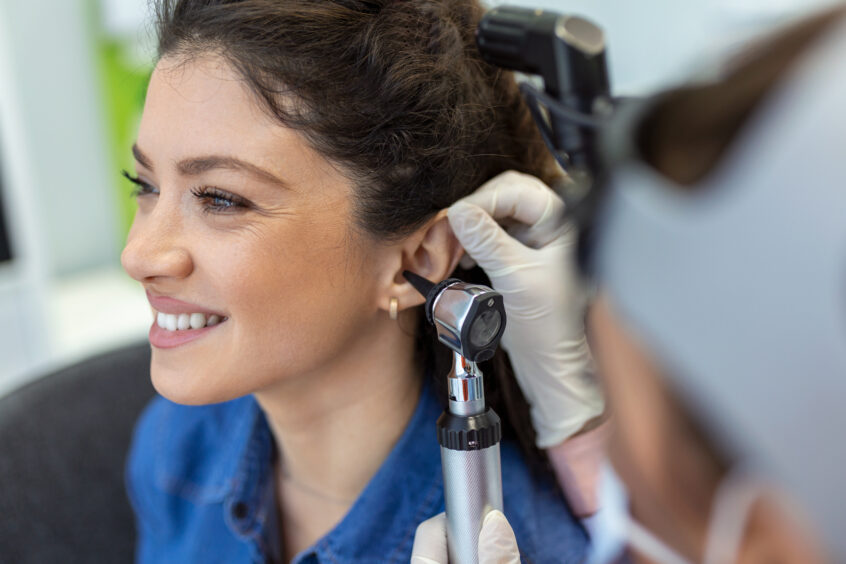Do your hearing aids whistle or “squeal” at times?
For those who wear hearing aids, probably one of the most annoying problems is when they whistle or “squeal.” After all, that high-pitched sound isn’t just heard by you, but can be heard by others who are near.
So, what causes your hearing aids to whistle or “squeal,” and what can you do about it?
Anyone who wears hearing aids is going to experience whistling or squealing at some time. This is called hearing aid feedback.
According to Widex.com, it happens when sound that was supposed to go into your ear canal leaves your ear and jumps back into the hearing aid microphone. The sound then gets reamplified, and this causes your hearing aids to whistle.
This feedback can happen at different times. It commonly occurs when you put your hearing aids on in the morning and take them off in the evening, or when someone hugs you. This is a normal phenomenon because the hearing aids are reacting to the sound bouncing back from your surroundings.
But not all hearing aid feedback is harmless. It also may be a sign that something could be wrong with your hearing aids, or they need to be cleaned. If that’s the case, you may want to schedule a visit with your audiologist.
In addition, many of today’s hearing aids have a feedback cancellation feature, but it doesn’t work in every case. There can be other issues causing your hearing aids to whistle or squeal. Here are the most common reasons you might experience this problem:
- Poor fit—You know how your jeans fit better or worse depending on whether you’ve gained a few pounds or lost a few? The same is true for hearing aids and your ears. Over time, your ears can change, sometimes due to weight loss or gain, or aging, and if they do, your hearing aids may not seal and fit properly. When that’s the case, the sound escapes your ear and jumps back into your hearing aids, causing feedback. To fix this issue, you may need to have new earmolds fitted to your ear.
Pro tip: Be sure your hearing aids are sitting tightly in your ear to prevent hearing aid feedback and see your audiologist if you suspect this might be the problem.
- Tubing broken—Sometimes, the tubing that connects to the earmold can harden and shrink, causing the tubing to pull on the earmold so that it doesn’t fit correctly.
Pro tip: Your audiologist can replace the tubing, which should solve this problem.
- Excessive earwax—When your ear canal is blocked by earwax, the sound can’t get through, causing the sound to bounce back into your hearing aids and making them whistle. Excessive earwax also can cause earaches and damage to your hearing.
Pro tip: Have your ears cleaned by an audiologist or other appropriate healthcare professional.
- Volume too high—You may be tempted to turn the volume up on your hearing aids, thinking that will help you hear better. But turning it up too loud can force the sound to re-enter your hearing aids, which causes whistling.
Pro tip: Your hearing aids will work better if you turn the volume down, avoiding the point where the sound gets so loud that it creates feedback.
- Dislodged microphones—Hearing aid feedback can also be caused by loose or displaced microphones.
Pro tip: An audiologist can check for this problem.
If you experience any of these issues with hearing aid feedback and don’t know why, talk with an audiologist. An audiologist is a health care professional who diagnoses and treats hearing and balance problems and who has earned an Au.D. (Doctorate in Audiology), or a Ph.D. doctoral degree from an accredited university graduate program. Audiologists specialize in:
- Testing hearing and balance.
- Recommending, servicing, and adjusting hearing aids .
- Recommending and providing assistive listening devices (products to enhance telephone conversations, television viewing, etc.).
- Providing tinnitus assessment and management.
- Providing education regarding the effects of noise on hearing and prevention of hearing loss.
- Delivering counseling and aural rehabilitation (counseling, education, auditory training/exercises).
- Making medical referrals to a physician when appropriate for issues such as ear pain, drainage from the ear, sudden hearing loss, cochlear implantation, etc.



